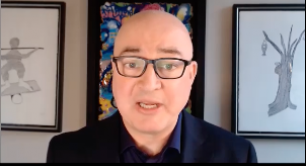Five ways the media can support the impact economy
In the past 15 years, press coverage of corporate sustainability topics has surged, and so has the audience for it, be it in mainstream business journalism or in specialist publications. That has added to the pressure on companies to demonstrate (and stick to) their green or ethical commitments. But in some regions, such as Eastern Europe, media coverage of environmental, social and governance (ESG) factors is limited – potentially slowing down a move towards sustainability, as company bosses do not realise they are not compliant.
Speaking at the webinar last week, “What is the media role in enhancing stakeholders’ capitalism?”, organised by EVPA, Hugh Wheelan, co-founder and joint managing director of Responsible Investor, Anna Patton, managing editor at Pioneers Post, and Sylvain Guyoton, senior vice-president of research at EcoVadis, a rating agency that evaluates companies’ ESG performance, explored ways in which the media can help drive the move towards corporate sustainability.
1. The stick
Wheelan said holding companies to account on their commitments to sustainability was a major part of the journalist’s job. “I’m a bit more of a ‘stick’ kind of journalist. I support solutions journalism wholeheartedly, but I tend to be more traditionalist because I think the issues are so important, and the relevance is so vital to the way businesses and companies, across the whole world and across all sectors, have to respond.”
Guyoton said the past few years had seen a rise in media pressure on companies; some investigations have had a major impact on corporates’ behaviour. Last year reporters uncovered allegations of poor working conditions in the supply chain of fashion retailer Boohoo – after which the company said it had “taken immediate action” and “reviewed [its] relationship with any suppliers who [had] subcontracted work to the manufacturer in question.” The scandal led to a 50% drop in the company's share price.
2. The carrot
Patton said that while Pioneers Post’s role was also to tell difficult stories and hold people to account, the publication tried to adopt a solutions-based approach to reporting, that didn’t focus solely on problems but rather on the responses to those problems. Far from telling a “good news story” for the sake of it, solutions journalism (a concept promoted by the Solutions Journalism Network) looked at tried-and-tested ways to respond to critical social issues – including the wider potential and limitations of the responses, she explained.
“Social entrepreneurs by nature are trying to find solutions, so it lends itself really well to this type of journalism,” Patton said. This also helped media organisations to have an impact – something important for Pioneers Post, which is a social enterprise itself – as detailed reporting on solutions that worked elsewhere could show that problems were not always inevitable and potentially lead to policy changes.
3. Independent reporting
In the past few years, sustainability issues had become more relevant, but also more complicated, complex, and harder to report on, said Wheelan.
People often struggle to understand that journalism is not PR, Wheelan said, adding that journalists “may have a tough relationship with people [they] are writing about”. He said: “We do what journalism should always be doing: informing people. Telling people things that some people don’t want told. People don’t want to read about themselves for the wrong reasons.”
We do what journalism should always be doing: informing people. Telling people things that some people don’t want told
Press coverage on sustainability issues was becoming more mature, sophisticated and insightful, Guyoton said, but the big amount of PR and advertising alongside it was a problem.
Quality, independent journalism that looked at both sides of the argument was under strain, according to Guyoton, not least because of limited funding. Investigative journalists, in particular freelancers, who were a “great source of information” for EcoVadis, were suffering from a difficult economic environment for the media, he said.
The foundation for all of this was a business model that allowed independence – whether it was based on subscriptions, philanthropy or partnerships, although each of them had constraints. Removing pressures from commercial actors and advertisers was key, Wheelan said.
4. Press as a measuring tool
Independent journalism could also help set a standard for good business.
Media coverage was an integral part of EcoVadis’s toolkit to assess companies’ ESG performance, Guyoton explained. Independent reporting allowed his agency to filter out PR and offered a “contradictory debate” so EcoVadis didn’t just rely on the company’s voice.
But before using the press as evidence of a company’s performance, it was essential to qualify the source of information and assess its legitimacy. EcoVadis put a big emphasis on distinguishing marketing and PR from independent journalism, using artificial intelligence to sift through millions of articles, Guyoton said.
5. Beyond journalism
Media organisations also played a role beyond journalism itself, through events and training for example, the speakers said.
As subjects were getting more complicated and controversial, with a lot of money involved, it was important to educate young journalists, Wheelan said. Organising events could also be a way to inspire, allowing social entrepreneurs to gather and learn from each other – which Pioneers Post did regularly with webinars and events such as the WISE (Women in Social Enterprise) series – Patton said.
Thanks for reading Pioneers Post. As an entrepreneur or investor yourself, you'll know that producing quality work doesn't come free. We rely on our subscribers to sustain our journalism – so if you think it's worth having an independent, specialist media platform that covers social enterprise stories, please consider subscribing. You'll also be buying social: Pioneers Post is a social enterprise itself, reinvesting all our profits into helping you do good business, better.




